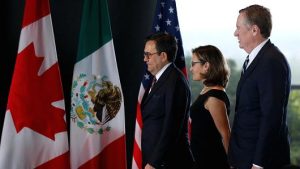A NAFTA sztori #4: újabb sikertelen kör
A jelek szerint nagyon nem halad a NAFTA újratárgyalása. Legalábbis az amerikai delegáció által elérni tervezett célok – a megállapodás „újrabalanszírozása” – egyre kevésbé tűnnek elérhetőnek. Igaz, továbbra is furcsa az olyan egyensúlyozás, ami szűkkörű és rövidtávú politikai, és nem széleskörű és hosszútávú gazdasági célokat szolgálnak.
A New York Times cikkében idézett Robert Lighthizer, az amerikai delegáció vezetője (és egyben az Egyesült Államok Kereskedelmi Képviselője), hangsúlyozta:
“I remain concerned about the lack of headway. Our teams will be meeting again next month in Washington. I hope our partners will come to the table in a serious way so we can see meaningful progress before the end of the year.”

Forrás: CNBC
Az előrelépés elvileg olyan területeken várható, mint a digitális kereskedelem, telekommunikáció (khm… azóta jött a hír, hogy az FCC felülírta a netes semlegességgel kapcsolatos amerikai szabályanyagot, ez nem tudom, fog-e tetszeni a másik két országnak), anti-korrupció, vámeljárások, valamint egészségügyi és élelmiszeri szabványok. Másrészt viszont nem látszanak csitulni a kedélyek az arbitrációs vitarendezés és a kártérítési szabályok, valamint a „rule of origin” kapcsán (utóbbinál Trump azt akarja, hogy a korábbiakhoz képest sokkal több autóalkatrészt a szerződő partnerek területén kelljen gyártani).
Ugyanakkor Lighthizer 2018. januárjáig nem ül tárgyalóasztalhoz Mexikó és Kanada képviselőivel. Az attitűd kevésbé szimpatikus voltát igazolja, hogy Mexikó szinte „ellentámadásba” lendült, amikor azt igazoló gazdasági elemzést mutattak be, miszerint a rule of origin igenis kártékony lenne a térség autóiparára. (Ezt az amerikai delegáció nem tartotta elfogadhatónak, pedig azt amerikai szereplők is megerősítették.) Egy ugyancsak csípős másik ellenjavaslatot is beterjesztett a mexikói delegáció, amely – amerikai elképzelésekre reagálva – azt jelezte, hogy a mexikói kormányzati megrendeléseket olyan összegekhez kötné, amilyen összegig mexikói cégek amerikai megrendeléseket nyernek el. Ebben a viszonylatban egyértelműen az Egyesült Államok járhatna rosszabbul, mivel a mexikói kormány sokkal több megrendelést ad le amerikai cégeknek, mint amennyit mexikóiak nyernek el az Egyesült Államokban.
A fejleményekről lásd még a CNBC cikkét, valamint a felek tárgyalási fázis előtti háromoldalú nyilatkozatát, valamint ugyanilyen nyilatkozatot a fázis lezárásáról is. Sokkal érdekesebb lehet az a dokumentum, ami az amerikai tárgyalási pozíciót foglalja össze. Ennek 9. oldalán olvashatunk a szellemi tulajdonvédelemről:
„Promote adequate and effective protection of intellectual property rights, including through the following:
• Obtain commitments to ratify or accede to international treaties reflecting best practices in intellectual property protection and enforcement.
• Provide a framework for effective cooperation between Parties on matters related to the adequate and effective protection and enforcement of intellectual property rights.
• Promote transparency and efficiency in the procedures and systems that establish protection of intellectual property rights, including making more relevant information available online.
• Seek provisions governing intellectual property rights that reflect a standard of protection similar to that found in U.S. law, including, but not limited to protections related to trademarks, patents, copyright and related rights (including, as appropriate, exceptions and limitations), undisclosed test or other data, and trade secrets.
• Provide strong protection and enforcement for new and emerging technologies and new methods of transmitting and distributing products embodying intellectual property, including in a manner that facilitates legitimate digital trade, including, but not limited to, technological protection measures.
• Ensure standards of protection and enforcement that keep pace with technological developments, and in particular ensure that rights holders have the legal and technological means to control the use of their works through the Internet and other global communication media, and to prevent the unauthorized use of their works.
• Prevent or eliminate government involvement in the violation of intellectual property rights, including cyber theft and piracy.
• Secure fair, equitable, and nondiscriminatory market access opportunities for United States persons that rely upon intellectual property protection.
• Prevent or eliminate discrimination with respect to matters affecting the availability, acquisition, scope, maintenance, use, and enforcement of intellectual property rights.
• Respect the Declaration on the TRIPS Agreement and Public Health, adopted by the World Trade Organization at the Fourth Ministerial Conference at Doha, Qatar on November 14, 2001, and to ensure that trade agreements foster innovation and promote access to medicines.
• Prevent the undermining of market access for U.S. products through the improper use of a country’s system for protecting or recognizing geographical indications, including such systems that fail to ensure transparency and procedural fairness, or adequately protecting generic terms for common use.
• Provide the means for adequate and effective enforcement of intellectual property rights, including by requiring accessible, expeditious, and effective civil, administrative, and criminal enforcement mechanisms. Such mechanisms include, but are not limited to, strong protections against counterfeit and pirated goods.”
Folytatás tehát 2018. január 23-28-a között Montréalban. S hogy addig bárki komolyan veszi-e amerikai professzorok azon meglátását, miszerint az új NAFTÁ-ba a fair use tesztet is be kell építeni, erősen kérdéses. Az infojustice.org oldalon megjelent anyag ugyanakkor kiváló jelzés arra nézve, hogy egy nemzetközi megállapodásnak nem kizárólag egyes államok egyes előjogait kellene garantálnia, hanem a társadalom szélesebb köreinek a (felhasználási) szabadságait is.
